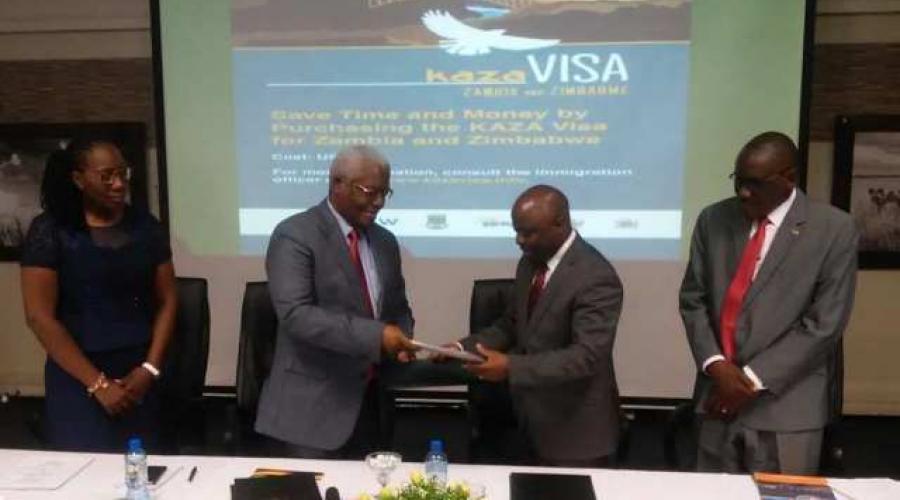KAZA UNIVISA returns on 21st December 2016
The KAZA TFCA has identified Tourism as one of the key socio-economic pillars of the TFCA. However, one of the major constraints in facilitating cross-border tourism development is the requirement for tourists to obtain visas specific to each of the countries. In pursuance of regional economic development through tourism, the Republics of Zambia and Zimbabwe, with support of the World Bank in partnership with the KAZA TFCA Secretariat, embarked on the development of the KAZA UNIVISA Pilot Project with the aim of facilitating easy movement of tourists between the two Pilot Countries. KAZA UNIVISA is one of the initiatives that will contribute immensely to regional tourism growth by allowing travelers to easily move across the Partner Countries, without having to apply for an entry visa into each country. This initiative is expected to increase tourist arrivals and the period of stay in the region and ultimately increase tourism receipts and Gross Domestic Product (GDP).
The KAZA UNIVISA Pilot Project was launched on 28th November 2014 with an initial period to run for six months. This was during a low season for tourism such that at the end of the pilot phase the evaluation did not reflect a satisfactory uptake of the UNIVISA. An extension of the pilot phase was granted by the KAZA TFCA Ministerial Committee in June 2015, for a further six months, to allow the pilot phase to cover the peak season of tourist arrivals as well. At the end of the extension of the pilot phase both countries are generally satisfied that the KAZA UNIVISA Pilot Project has been a success and was highly accepted by the tourists and stakeholders. The pilot phase allowed the testing of the newly developed system before its roll out to the rest of the Partner Countries and possibly beyond. During this period there were technical challenges experienced, which can be best addressed by the embedding of the UNIVISA system into the National Border Management Systems.
Considerable time has passed without the issuance of the KAZA UNIVISA. This suspension on the issuance of the KAZA UNIVISA, allowed the two countries to sort out internal preparations for the roll out phase of the KAZA UNIVISA as a permanent arrangement between the two countries, while the rest of the KAZA partner state continues with their internal consultations. It is the desire of both Zambia and Zimbabwe that the roll out phase shall lead to the ultimate incorporation of the other three (3) partner states into this commendable development initiative for the growth of the Tourism Sector in the region.
On the 21st of December 2016, Zambia and Zimbabwe will launch the roll out phase of the KAZA UNIVISA, in Livingstone Zambia, where the Ministers of Home Affairs from both Zambia and Zimbabwe will sign a Memorandum of Understanding symbolizing the commencement of the permanent issuance of the KAZA UNIVISA. The KAZA UNIVISA is one of the successful achievement of the KAZA TFCA initiative that is aimed at regional tourism growth and the launch of the UNIVISA between Zambia and Zimbabwe provides an optimal opportunity for the other KAZA partner states to ride on the successful implementation of the KAZA UNIVISA and move with speed to roll out the UNIVISA to the rest of KAZA and beyond.
It is worth noting that the KAZA UNIVISA initiative stems from the SADC Protocol on the Development of Tourism of 1998. One of the objectives of this protocol is “to facilitate intra-regional travel for the development of tourism through easing or removal of travel and visa restrictions and harmonisation of immigration procedures”. The Protocol further states that “Member States shall endeavour to make the entry and travel of visitors as smooth as possible and shall remove practices likely to place obstacles to the development of travel and tourism both regional and international”. From this protocol one of the travel facilitation initiatives is to smoothen visitor travel through the development of a “tourism visa which will facilitate movement of international tourists in the region in order to increase the market share and revenue of the region in world tourism on the basis of arrangements to be negotiated and agreed upon by Member States”.


